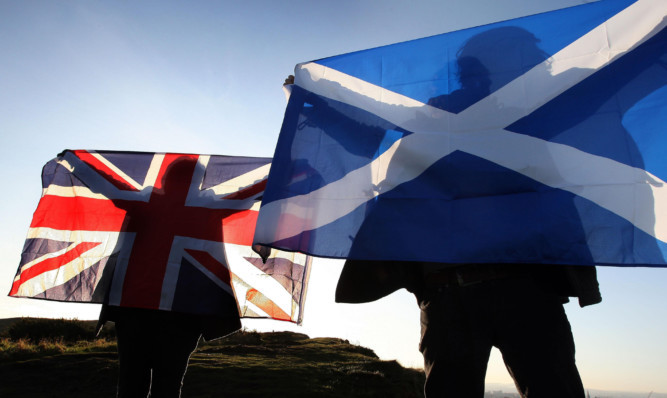
Support among Scots for independence has moved ahead of opposition, but most people do not want a vote on the issue this year, according to a new poll.
The YouGov research gave a 51% lead for Yes support, putting it ahead for the first time in the firm’s polling since 2015.
But in the survey of 1,039 Scots aged over 16, 56% said they would not like to see another vote this year.
Meanwhile 46% of people believe if the SNP win the Scottish Parliament election next year there should still not be another referendum, compared to 41% who believe there should be another poll.
But 44% said they would be keen to vote again on Scotland’s constitutional future in the next five years – compared to 39% who are against the idea.
Despite the increase in support for independence, respondents were pessimistic about the economic impact of leaving the UK, with 42% believing Scotland would be worse off, whereas 35% thought the country would be more financially sound.
The poll comes the day before First Minister Nicola Sturgeon sets out the “next steps” for Scotland, after her request for the devolution of powers from the UK Government to hold another vote was denied.
On Wednesday, the Scottish Parliament voted to endorse another referendum.
The Scottish Green Party is also set to relaunch its own independence campaign on Friday in Glasgow.
The YouGov research also found Ms Sturgeon continues to be the most trusted politician in the UK, boasting a net zero trust rating, with 46% in both trust and distrust categories.
Fellow Scottish leaders Willie Rennie, Richard Leonard and Jackson Carlaw all had negative trust ratings, with 18% of people saying they trust Mr Rennie, 8% trusting Mr Carlaw and 6% for Mr Leonard.
The leaders of the UK’s two main parties also suffered far worse than their Scottish counterparts on trust, with 73% of people saying they do not trust Jeremy Corbyn and 71% saying the same of the Prime Minister.
A spokesman for the First Minister said: “We’ve known ever since the Brexit vote that a lot of people who voted No in 2014 have been changing their minds or considering changing their minds at least about independence, and I think the looming reality of Brexit will be crystallising the thought in a lot of people’s heads that Scotland should be an independent country.”
He also cited the figures as further support of a desire for a referendum – despite Tory claims that Scots do not want another vote on the issue.
“It is a complete fallacy,” he said.
“They claim there is no desire for independence or a referendum, it is completely untrue. It is verifiably, palpably untrue.”
Scottish Greens co-leader Patrick Harvie said it is “no coincidence” the poll shift comes on the eve of Brexit.
He said: “People in Scotland can see there is a route back to the European table through independence, and they can see that Green politicians and others across the continent would welcome an independent Scotland taking its place among other smaller progressive countries.”
Chris Curtis, YouGov’s political research manager, said: “These are concerning times for unionists both north and south of the border with Yes gaining considerable ground on No since 2014.
“But ultimately, whether a referendum happens won’t be decided by polling, but the political manoeuvres of the Scottish and British governments.
“If there is a referendum, Scottish opposition to Brexit does give nationalists an opportunity to win more voters over to their cause.
“Yet the fundamental problem that flummoxed the Yes movement in 2014, that independence would damage the economy, still exists and could still set them back in indyref2.”

Enjoy the convenience of having The Sunday Post delivered as a digital ePaper straight to your smartphone, tablet or computer.
Subscribe for only £5.49 a month and enjoy all the benefits of the printed paper as a digital replica.
Subscribe